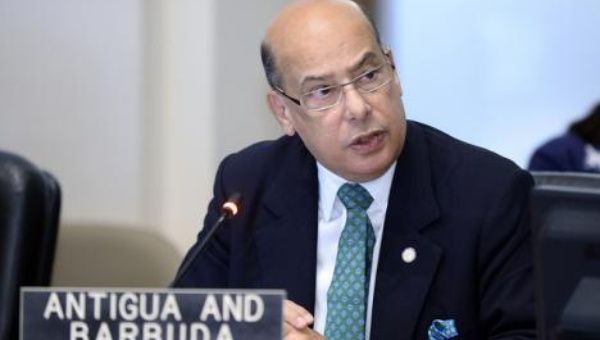The announcement by the President of Kenya Uhuru Kenyatta that his government has nominated the country’s energy minister, Monica Juma, for the post of Commonwealth Secretary-General, has re-opened the contention surrounding “turns” to hold the post.
However, there is no such thing as ‘turns’ in the rules of the Commonwealth. And, the concept of ‘turns’ has never been used as a criterion for proposing candidates for the job.
‘Turns’ is a contrivance utilised by governments of countries in regions of the world that have not held the post. But, the job of Secretary-General has always been open to any Commonwealth citizen qualified for the consideration by Heads of Government.
Below, I set out the Secretaries-General of the Commonwealth from the inception of the job; the countries from which they came; the candidates who challenged them to demonstrate that ‘turns’ is a stratagem of recent vintage which, if slavishly followed, would deprive the Commonwealth of the best talents to carry out the vital duties of Secretary-General.
In 1965, when the Heads of Government elected the Canadian Arnold Smith as Secretary-General, there were five other contenders from Australia, New Zealand, Sierra Leone and Ceylon (now Sri Lanka). In 1975 and again in 1980, Shridath ‘Sonny’ Ramphal of Guyana was elected unopposed, but he was unsuccessfully challenged by an Indian in 1985.
In 1990, Emeka Anyaoku of Nigeria was elected, having fended off a strong contender in Malcolm Fraser of Australia, but term limits were then limited to two; he was re-elected in 1995 when the period of a term was reduced from five to four years. In 2000, the New Zealander, Don McKinnon, was elected but he had to fight off a challenge from Farook Sobhan of Bangladesh.
In 2008, the Indian, Kamalesh Sharma, was elected but faced a strong challenge from Michael Frendo of Malta. In 2014, the contenders were Baroness Scotland nominated by Dominica and promoted by Britain where she had been Attorney-General and continues to be a member of the British House of Lords; Mmasekgoa Masire-Mwamba of Botswana and me from Antigua and Barbuda.
The Secretary-General therefore has come from: Canada, Guyana, Nigeria, New Zealand, India, Dominica. In terms of regions and the contrivance of ‘turns’, this translates into: Canada, Caribbean Arica, Pacific, Asia, Caribbean. But if ‘turns’ were really the criterion, after India (Asia), it should not have been Caribbean’s ‘turn’; it should have been the turn of Europe (either Cyprus or Malta) and if Europe gave-up its ‘turn’, it should have gone to Canada at which point the cycle should have been re-started.
However, the reality is that there is no such criterion as ‘turns’ for the job of Commonwealth SG. And if there is, then the Caribbean jumped its turn in 2015, and it should now definitely be the turn of either Malta or Cyprus before returning to Canada. If not Europe and North America are being denied the chance of nominating candidates for the post. The idea of regional ‘turns’ is limiting and self-defeating.
Some countries in the Caribbean are insisting that it is the Caribbean’s “turn” to hold the post for two terms (eight years). Therefore, even though English Baroness Patricia Scotland was elected, ostensibly as coming from the Caribbean because she was born in Dominica which she left at the age of two, for the term 2016 to 2020, it is contended by her Caribbean supporters that she is entitled to a second term, running from April 2020 to 2024.
The story gets complicated because, the Baroness’ elected-term officially ended in April 2020, but because of the COVID-19 pandemic, Commonwealth Heads of Government could not meet to consider candidates for the term 2020 to 2024. Consequently, the Baroness was allowed to remain in the post until such time as the election could be held. She has, therefore, not only served the term for which she was elected by a majority of one vote with several abstentions, she has also segued into a further year and six months, so far, into an unelected term.
This period has not been uncontroversial. In February 2020, Boris Johnson, who has been serving as Chair of the Commonwealth since 2019 when he was elected Prime Minister of Great Britain, stated in a letter to all Commonwealth Heads of Government that a majority of them had indicated to him rejection of a plan “to offer Lady Scotland another four years in office”. The leaders agreed only to a short three-month extension of her contract which ended on 31 March, 2020.
As it turned out, the Heads of Government meeting, slated for Rwanda in June 2020, was postponed twice, first to June 2021 and now to later this year.
The Government of Kenya now feels that, in so far as it believes ‘turns’ exist, the Caribbean has had its turn, and now it is Africa’s turn. Significantly, African countries did not support the British Baroness at the 2015 election in Malta; they stood solidly behind the Botswana candidate, Mmasekgoa Masire-Mwamba, in the second round of voting. I was eliminated in the first round because promised African votes went to Masire-Mwamba.
In reality, the notion of ‘turns’ was never a criterion for the job, and persons are only elected for one term at a time. The criterion for the job was – and should be – a Commonwealth citizen with a proven track record of knowledge and experience of Commonwealth affairs; a deep commitment to its values; a vision of the role it can play in effectively serving the interests of each of its 54 states, especially its 32 small members; and advancing the Commonwealth as a force for good in global affairs.
There should be a contest for the post, and outstanding candidates from anywhere in the Commonwealth should contend without restriction.







